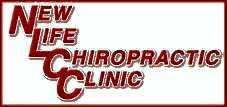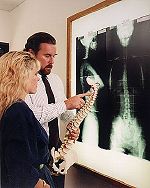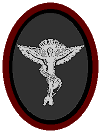
Q.
Dear Dr Harvey,
Lately, I have been suffering from a great deal of pain in my jaw. The
pain is getting worse and now I am getting headaches. I was told I might
have TMJ syndrome. What is this and can you help me?
|
|
A. TMJ syndrome refers to the temporomandibular joint. This
is the joint where the jay connects to the head. TMJ syndrome occurs when
the joint is misaligned or malfunctioning in some way.
The symptoms of TMJ syndrome vary widely. One of the more common symptoms is an inability to move the jaw without pain. A clicking or popping sound may be heard even with no pain.
More severe symptoms may be headaches, even migraines; tinnitus; neck, face, shoulder or eye pain; vision trouble; or dizziness.
TMJ syndrome can be caused by a number of different things. Trauma may be involved, such as an auto accident or a fall that involves the head. A common cause is dental work, especially major dental work such as installing braces or a crown. When the mouth is open for a long period of time and has been numbed, the jaw may come out of its normal alignment, resulting in TMJ syndrome.
Ill-fitting braces,crowns, or dentures may also contribute to the problem.
Some of the standard dental or medical approaches to treating TMJ syndrome include muscle relaxants, painkillers, night guards or physical therapy. In severe cases surgery may be tried. PLEASE -- before you try surgery, get a number of other opinions. Also make sure that one of those opinions is from a chiropractor who treats TMJ syndrome.
In my clinic we have treated hundreds of TMJ syndrome patients very successfully. We often find the problem to be misalignment of the TMJ.
Best of all, realignment is a painless procedure.
There may also be contributing factors such as vertebral subluxations in the cervical spine. Once the TMJ and cervical spine are adjusted, acupuncture and massage therapy may also be used, which are also available in our clinic.
The TMJ syndrome problem can be helped. The key is to start care ASAP and to go to the right place for care. For anyone who would like help in the treatment of TMJ syndrome, please give us a call -- you'll be glad you did.

